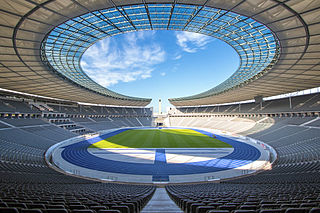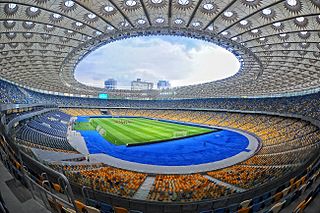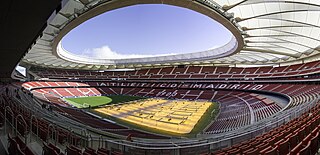
The England national football team has represented England in international football since the first international match in 1872. It is controlled by The Football Association (FA), the governing body for football in England, which is affiliated with UEFA and comes under the global jurisdiction of world football's governing body FIFA. England competes in the three major international tournaments contested by European nations: the FIFA World Cup, the UEFA European Championship, and the UEFA Nations League.

The Italy national football team has represented Italy in international football since its first match in 1910. The national team is controlled by the Italian Football Federation (FIGC), the governing body for football in Italy, which is a co-founder and member of UEFA. Italy's home matches are played at various stadiums throughout Italy, and its primary training ground and technical headquarters, Centro Tecnico Federale di Coverciano, is located in Florence. Italy are the reigning European champions, having won UEFA Euro 2020.

The Portugal national football team has represented Portugal in international men's football competition since 1921. The national team is controlled by the Portuguese Football Federation (FPF), the governing body for football in Portugal. Portugal's home matches are played at various stadiums throughout Portugal, and its primary training ground and technical headquarters, Cidade do Futebol, is located in Oeiras. The current head coach of the team is Fernando Santos and the captain is Cristiano Ronaldo, who also holds the team record for most caps and for most goals.

The Scotland national football team represents Scotland in men's international football and is controlled by the Scottish Football Association. It competes in the three major professional tournaments: the FIFA World Cup, UEFA Nations League and the UEFA European Championship. Scotland, as a country of the United Kingdom, is not a member of the International Olympic Committee, and therefore the national team does not compete in the Olympic Games. The majority of Scotland's home matches are played at the national stadium, Hampden Park.

The Republic of Ireland national football team represents the Republic of Ireland in men's international football. It is governed by the Football Association of Ireland (FAI).

The Netherlands national football team has represented the Netherlands in international men's football matches since 1905. The men's national team is controlled by the Royal Dutch Football Association (KNVB), the governing body for football in the Netherlands, which is a part of UEFA, and under the jurisdiction of FIFA. They are widely considered one of the best national teams in world football and widely regarded as one of the greatest national teams of all time.Most of the Netherlands' home matches are played at the Johan Cruyff Arena, De Kuip, Philips Stadion and De Grolsch Veste.
In the qualifying procedure for the 1988 UEFA European Under-16 Football Championship, 29 teams were divided into 14 groups each. The fourteen group winners advanced to the final tournament. The runner-up of the group with three teams and Spain were also qualified.

The 2020 UEFA European Football Championship, commonly referred to as UEFA Euro 2020 or simply Euro 2020, was the 16th UEFA European Championship, the quadrennial international men's football championship of Europe organised by the Union of European Football Associations (UEFA). To celebrate the 60th anniversary of the European Championship competition, UEFA president Michel Platini declared that the tournament would be hosted in several nations as a "romantic" one-off event, with 11 cities in 11 UEFA countries each providing venues for the tournament. Defending champions Portugal, who won UEFA Euro 2016 in France, were eliminated in the round of 16 by Belgium. Italy won their second European Championship title by beating England on penalties in the final following a 1–1 draw after extra time. The win came exactly on the 39th anniversary of Italy's 1982 FIFA World Cup Final win over West Germany.

The 2014–15 UEFA Champions League was the 60th season of Europe's premier club football tournament organised by UEFA, and the 23rd season since it was renamed from the European Champion Clubs' Cup to the UEFA Champions League.

The qualification for the 2015 FIFA Women's World Cup determined which 23 teams joined Canada, the hosts of the 2015 tournament, to play for the Women's World Cup.

The 2015–16 UEFA Champions League was the 61st season of Europe's premier club football tournament organised by UEFA, and the 24th season since it was renamed from the European Champion Clubs' Cup to the UEFA Champions League. Barcelona were the title holders, but were eliminated by Atlético Madrid in the quarter-finals.

The 2015–16 UEFA Women's Champions League was the 15th edition of the European women's club football championship organised by UEFA, and the 7th edition since being rebranded as the UEFA Women's Champions League.
The 2016 UEFA European Under-19 Championship qualification was a men's under-19 football competition organised by UEFA to determine the seven national teams joining the automatically qualified hosts Germany in the 2016 UEFA European Under-19 Championship final tournament.

The 2017–18 UEFA Champions League was the 63rd season of Europe's premier club football tournament organised by UEFA, and the 26th season since it was renamed from the European Champion Clubs' Cup to the UEFA Champions League.

The 2018–19 UEFA Champions League was the 64th season of Europe's premier club football tournament organised by UEFA, and the 27th season since it was renamed from the European Champion Clubs' Cup to the UEFA Champions League. For the first time, the video assistant referee (VAR) system was used in the competition from the round of 16 onward.

The 2018–19 UEFA Europa League was the 48th season of Europe's secondary club football tournament organised by UEFA, and the 10th season since it was renamed from the UEFA Cup to the UEFA Europa League.
The 2018–19 UEFA Nations League A was the top division of the 2018–19 edition of the UEFA Nations League, the inaugural season of the international football competition involving the men's national teams of the 55 member associations of UEFA. League A culminated with the Nations League Finals in June 2019, which crowned Portugal as the inaugural champions of the UEFA Nations League.

The 2019–20 UEFA Youth League was the seventh season of the UEFA Youth League, a European youth club football competition organised by UEFA.

The European section of the 2022 FIFA World Cup qualification acted as qualifiers for the 2022 FIFA World Cup, to be held in Qatar, for national teams that are members of the Union of European Football Associations (UEFA). A total of 13 slots in the final tournament were available for UEFA teams.
The UEFA second round of the qualification tournament for the 2022 FIFA World Cup, also known as the UEFA play-offs, was contested by twelve teams from the UEFA segment of qualifying. The play-offs determined the final three European teams that joined the group winners at the World Cup in Qatar. The ten runners-up from the UEFA first round groups participated in the play-offs, along with two group winners from the 2020–21 UEFA Nations League. The teams were divided into three paths, each containing four teams, with each play-off path featuring two single-leg semi-finals, and one single-leg final. The matches took place in March and June 2022.















